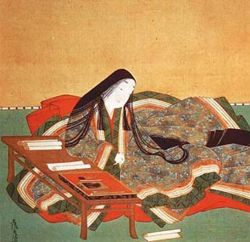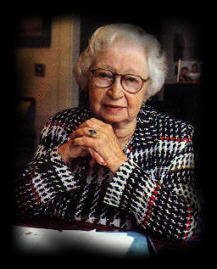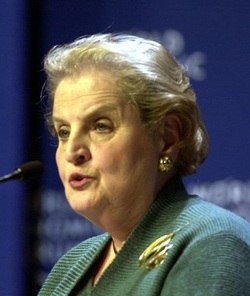 By Yoon Joung Lee One of Japan’s greatest novelists during the Heian period and the author of The Tale of Gengi, Murasaki Shikibu was born c. 973 in Kyoto, Japan into the Fukiwara family, whose men dominated the highest positions in the imperial government. During her childhood, Shikibu was very smart and intelligent. She always learned things more quickly than her brother. Therefore, her father allowed her to study with her brother, although it was inappropriate to educate women as much as men at that time. In 966 in her early 20s, she married her father’s friend Fujiwara no Nobutake who was a much older distant cousin. In 999, her only daughter was born. Two years later in 1001, her husband died. In 1006 not too long after her husband’s death, she was brought to court for her outstanding talent on writing stories and her brilliant mind. While Shikibu was in court, she wrote a diary showing a vivid account of court life and her thoughts. It is not clear whether she started The Tale of the Genji before or after she came to court. However, much of her work was written in court. This long novel relveals the complications of a fictitious prince, Genji, his life and his amorous adventures. The story pictures Japanese court life during the Heian period. There are also the portraits of the women in Prince Genji’s life in the novel and they are described individually with their different talents such as music, drawing, and poetry. The conclusion reveals a Buddhist point of view to enjoy life and earthly existence. The Tale of Gengi was copied and transferred to many different languages worldwide. It is speculated to be the world's first novel. Although it is not certain about the date of her death, she likely passed away shortly after she completed the famous novel, The Tale of Genji, at the age of forty or so.  Yoon Joung Lee Many people remember about Anne Frank. But, far fewer know about Miep Gies. Miep Gies was one of the Dutch citizens who hid Frank’s family and several family friends in the secret room above her business place during World War II. She later discovered Anne Frank’s diary after the Franks were arrested. Miep Gies was born in 1909 in Vienna. She spent her childhood with poverty and disease. When she was 12, she suffered from tuberculosis and poor nutrition. She was sent to a family in Amsterdam to escape the food shortages in Austria. The family made modest income and they welcomed her although they already had five children. She grew up sharing everything with her Dutch foster family and was significantly influenced by their values. She was helped by her family when she was in trouble and she believed that it is our human duty to help those who are in trouble. Therefore, she willingly helped the Franks when they asked for help. During their years of hiding, Miep provided all of their daily material needs, such as food, clothing and books. Also, she provided not only their material needs, as she played the role of bridge with the outside world. In 1944, her heroic feat of humanitarianism ended as the people hidden in Miep’s attic were arrested. The Frank family was betrayed by a person whose identity remains unknown. Before the authorities emptied the attic after the arrest, Miep found Anne’s diary and kept it in her desk drawer. Even after the arrest, her efforts did not stop. She met the Austrian SS officer who had arrested them and she tried to bribe them to release her friends. She also visited Nazi headquarters to negotiate a deal. However, none of them was successful. She safely kept Anne’s diary and expected her to return when the war ended. Their father Otto returned from Auschwitz and he believed his two daughters had survived although his wife and friends had not. However, they learned of Anne’s death in Bergen-Belsen by a letter confirming that both daughters had died in March 1945, less than a few weeks before the camp was liberated by British soldiers. Miep gave a diary to Otto and it was published in 1947. The book, The Diary of Anne Frank, became the top best seller in the non-fiction genre after the bible in the world. For the rest of her life, Miep Gies devote herself to spreading out Anne Frank's legacy over the world. While she was taking a risk with her own life, she protected and cared for the Jews from the Nazis for more than two years. The heart of her character represented moral courage and modesty. She died at the age of 100 in the Netherlands in 2010.  The first female Secretary of State, Madeleine Korbel Albright, was born in 1937 in Czechoslovakia. She was born to Jewish parents; Josef Korbel, a Czech diplomat and Anna, his wife. She is the first child out of three. In 1939, her family escaped the Nazi occupation in Czechoslovakia. When she came to the United States and settled in Colorado, she was an 11 year old girl. In the States, she pursued her academic career while becoming a naturalized citizen. She finished her Bachelor’s degree in Political Science from Wellesley College in 1959. She received her Master’s degree in 1968 and doctorate degree in Public Law and Government from Columbia University in 1976. In 1978, as her former professor Zbigniew Brzezinski became the National Security Advisor, he recruited her as the National Security Council’s congressional liaison. This opportunity allowed her to establish herself as an expert in Foreign Affairs. She remained there until 1981, when she started writing a book about the role of the press in influencing political change in Poland from 1980 to 1982. In 1982, she worked for Georgetown University as a research professor of international affairs and director of women students in the University’s School of Foreign Service. She also joined the Georgetown University Center for Strategic and International Studies as a senior fellow in Soviet and Eastern European Affairs. In 1981, she became a president for the Center for National Policy, a nonprofit research organization serving as a Democratic think tank. Although, Albright was raising her three daughters by herself after her divorce, she was a board member on numerous institutes, including national commissions, civic organizations, and the National Democratic institute for International Affairs. In 1993, President Bill Clinton appointed Albright the U.S. ambassador to the United Nations, and then in late 1996, she was chosen by President Clinton for the position of Secretary of State. She was unanimously confirmed by the U.S. Senate in 1997 and became the first female Secretary of State. Albright served the Clinton administration throughout his second term. In 1997, she flew to the Middle East to meet with Israeli Prime Mister Benjamin Netanyahu to discuss the relation between Israel and Palestine. Her trip to the Middle East was a great start for a peace mission and provided significant opportunity in finding a wide gap between the missions of the Clinton administration and the Israeli government. With Netanyahu’s meeting, she aggressively condemned the activities of terrorists, but she also led Natanyahu to recognize Palestinian problems and make concessions. In 2000, she made history again as she visited North Korea’s leader, Kim Jong Il to lay the groundwork for Clinton’s possible next visit. She was the first United States Secretary of State and highest U.S. official thus far, to visit North Korea. In 2001, when George Bush took over the presidency, Albright went back to Georgetown University to serve as a professor. Yoon Joung Lee |
Archives
July 2017
Categories
All
|
 RSS Feed
RSS Feed